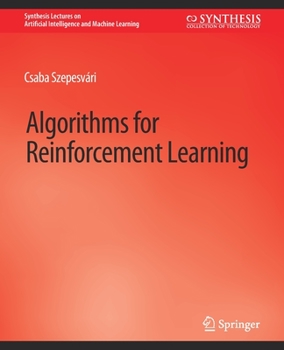Algorithms for Reinforcement Learning
Select Format
Select Condition 
Book Overview
Reinforcement learning is a learning paradigm concerned with learning to control a system so as to maximize a numerical performance measure that expresses a long-term objective. What distinguishes reinforcement learning from supervised learning is that only partial feedback is given to the learner about the learner's predictions. Further, the predictions may have long term effects through influencing the future state of the controlled system. Thus, time plays a special role. The goal in reinforcement learning is to develop efficient learning algorithms, as well as to understand the algorithms' merits and limitations. Reinforcement learning is of great interest because of the large number of practical applications that it can be used to address, ranging from problems in artificial intelligence to operations research or control engineering. In this book, we focus on those algorithms of reinforcement learning that build on the powerful theory of dynamic programming. We give a fairly comprehensive catalog of learning problems, describe the core ideas, note a large number of state of the art algorithms, followed by the discussion of their theoretical properties and limitations. Table of Contents: Markov Decision Processes / Value Prediction Problems / Control / For Further Exploration
Format:Paperback
Language:English
ISBN:303100423X
ISBN13:9783031004230
Release Date:July 2010
Publisher:Springer
Length:89 Pages
Weight:0.43 lbs.
Dimensions:0.2" x 7.5" x 9.3"
Related Subjects
Computers Computers & Technology Engineering Math Mathematics Science & Math TechnologyCustomer Reviews
0 rating





